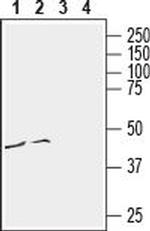FIGURE: 1 / 2
CCR3 (extracellular) Antibody (ACR-023-200UL) in WB


Product Details
ACR-023-200UL
Species Reactivity
Host/Isotype
Class
Type
Immunogen
Conjugate
Form
Concentration
Purification
Storage buffer
Contains
Storage conditions
Shipping conditions
Product Specific Information
Reconstitution: 25 µL, 50 µL or 0.2 mL double distilled water (DDW), depending on the sample size. The antibody ships as a lyophilized powder at room temperature. Upon arrival, it should be stored at -20C. The reconstituted solution can be stored at 4C for up to 1 week. For longer periods, small aliquots should be stored at -20C. Avoid multiple freezing and thawing. Centrifuge all antibody preparations before use (10000 x g 5 min).
Target Information
CCR3 (C-C chemokine receptor type 3) binds to eotaxin, eotaxin-3, MCP-3, MCP-4, RANTES, and MIP-1 delta. CCR3 trasnduces a signal by increasing the intracellular calcium ions level. It also serves as an alternative co-receptor with CD4 for HIV-1 infection. Other chemokines play important roles in inflammation and are critical for the recruitment of effector immune cells to sites of infection. Chemokines activate leukocytes by binding to G protein coupled receptors. The ever-growing chemokine receptor subtypes can be divided into 2 major groups, CXCR and CCR, based on the 2 major classes of chemokines.
For Research Use Only. Not for use in diagnostic procedures. Not for resale without express authorization.
References (0)
Bioinformatics
Protein Aliases: b-chemokine receptor; C C CKR3; C-C chemokine receptor type 3; C-C CKR-3; CC chemokine receptor 3; CCR-3; CD193; chemokine (C-C motif) receptor 3; eosinophil CC chemokine receptor 3; Eosinophil eotaxin receptor; MGC102841
Gene Aliases: CC-CKR-3; CCR3; CD193; CKR3; CMKBR3
UniProt ID: (Human) P51677
Entrez Gene ID: (Human) 1232

Performance Guarantee
If an Invitrogen™ antibody doesn't perform as described on our website or datasheet,we'll replace the product at no cost to you, or provide you with a credit for a future purchase.*
Learn more
We're here to help
Get expert recommendations for common problems or connect directly with an on staff expert for technical assistance related to applications, equipment and general product use.
Contact tech support
